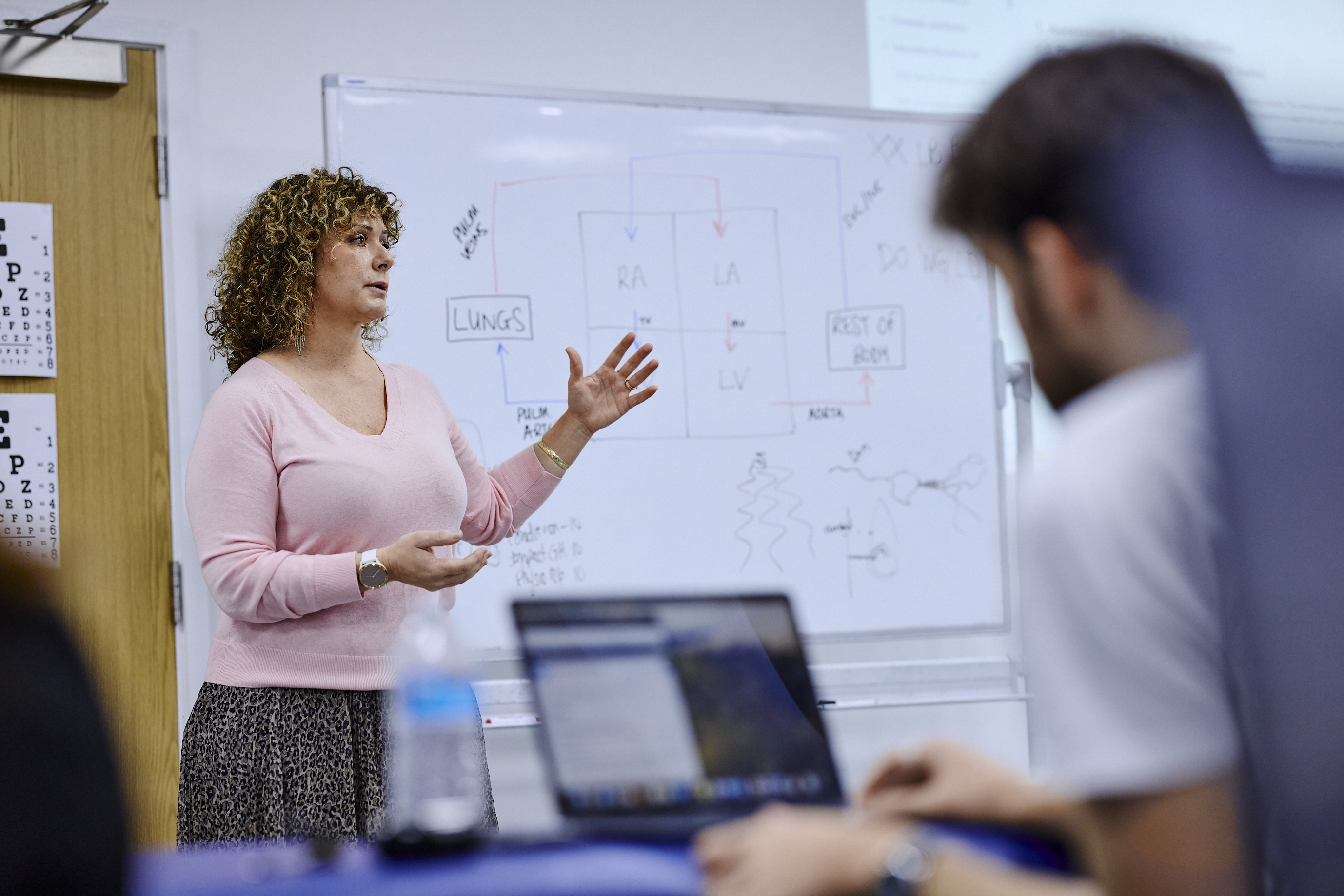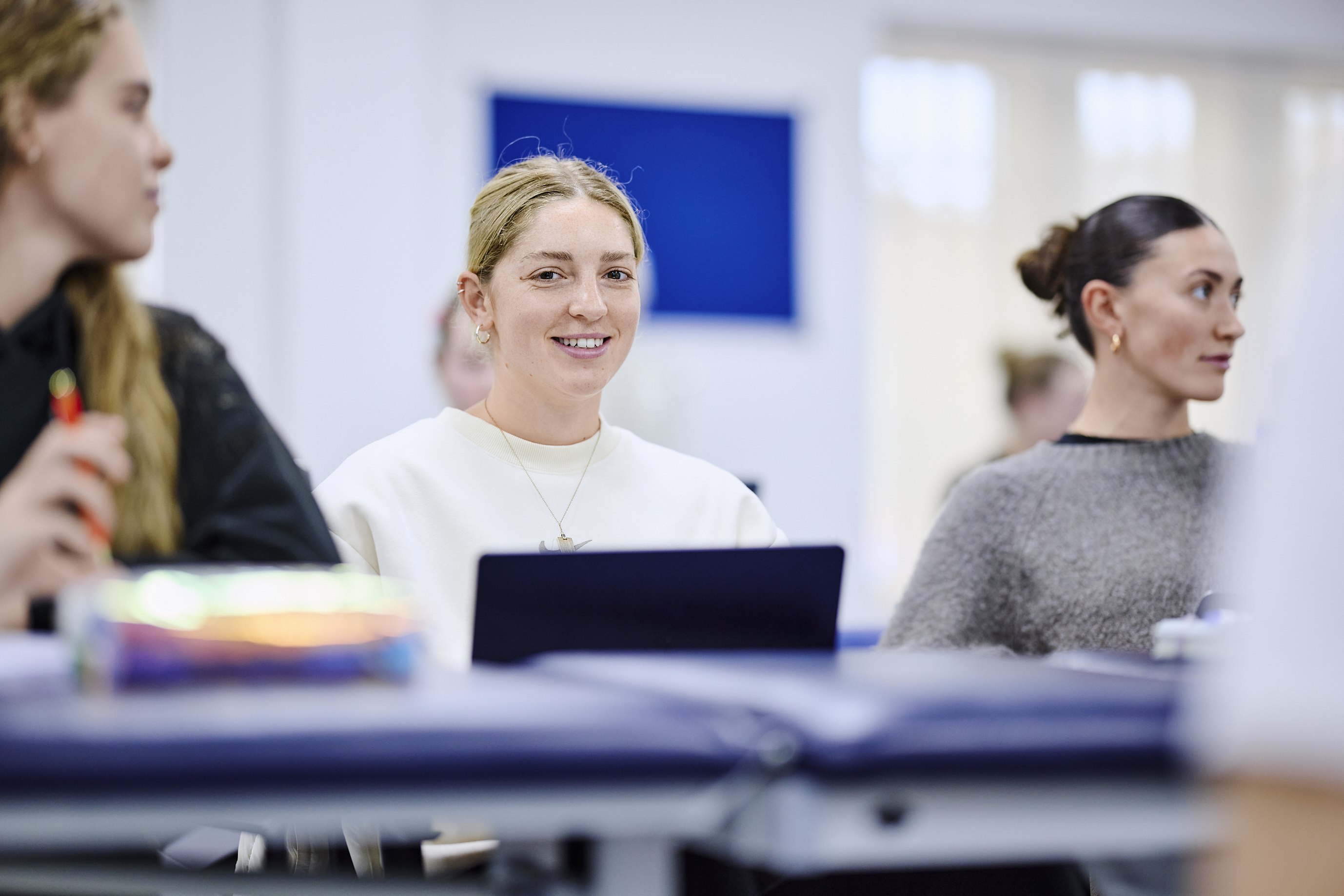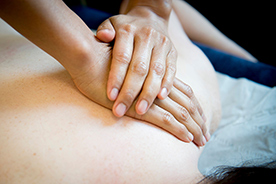Study our London-based physiotherapy degree and lay the best foundations for a rewarding, challenging, and flexible career as a physiotherapist
Physiotherapy makes a positive change to people’s lives in an extensive range of settings.
Our Physiotherapy degree takes a contemporary approach:
- we prepare you for work within the ever-changing health and social care environment
- we take a patient-centred approach to practice
- we use a blended teaching style, combing theory and practice throughout.
During the course, you will examine all areas of physiotherapy, including:
- clinical anatomy
- physiology and pathology
- research methods
- physiotherapeutic management of complex patients.
We combine theory and practice throughout the BSc, incorporating a range of well supported clinical placements. You will also develop your communication, professionalism, and leadership skills. As a result, you’ll stand out from the crowd, well-equipped for a career upon graduation.
Once you’ve completed our Physiotherapy course, you can apply for registration and membership with our accreditors and governing bodies: the Chartered Society of Physiotherapy (CSP) and the Health and Care Professions Council (HCPC).
Expert teaching and support
On our Physiotherapy BSc, you will learn from a team of dedicated lecturers with strong clinical experience. You will also learn in small groups so your teachers can support you to become an exceptional physiotherapist.

State-of-the-art facilities
Under our Physiotherapy degree, you learn in our state-of-the-art facilities, including:
Clinical placements: build professional experience
We offer an exciting array of work placements under the guidance of skilled clinicians across and close to London. Through these placements, you'll experience diversity in practice, build appreciation for NHS core values, and apply your learning to a wide range of settings.
Previous students have worked within:
- NHS and private settings
- sports teams and clubs
- schools
- research settings
- specialist settings, such as amputee rehabilitation, women's health, and robotics.

Chat to us
Chat to us
Applying to university can be daunting, and you may have questions about applying, student life, or your course.
Course content
Modules
These modules are the modules that were available to students in the 2024/25 academic year and are illustrative of what may be offered for 2025/26.
Please note: it is possible that a module listed on the website will not be able to run due to reasons beyond our control. For more information please refer to our course information disclaimer.
How the degree is taught
Teaching methods
You'll be taught on our beautiful and historic campus located in Twickenham, London.
The programme takes a blended learning approach for knowledge and skills acquisition and development. These include theory and practical sessions as well as group and seminar work. In addition, there are multiple online resources and students encouraged to do guided learning by using these resources in order to support their learning.
The level 4 (year one) programme begins with an induction in which you work on group activities designed to develop communication, listening and teamwork skills. There is also the opportunity to work together and get to know your peers in a fun setting, whilst practising the skills that are needed throughout the course of the programme.
These themes continue into levels 5 and 6 (years two and three) where clinical placements are included. Surrounding the placements are intensive periods of teaching where the appropriate clinical and academic skills are taught.
One of the key characteristics of this course and the blended learning that follows is that students are part of a small cohort of no more than 35 students making theoretical sessions very direct and students to feel supportive by the lectures and mentors. Also, during practical sessions these number can be split to small groups of four people in order to achieve higher performance of students during practical skills.
Assessment methods
Modules are assessed through a variety of methods, including written theory examinations, vivas, oral presentations and written coursework across all levels.
The practical viva's form a significant part of the assessments due to the clinical nature of the programme. In addition, at level 6 there is an independent research project to complete, as well as a formal clinical examination at the end of the degree.
Further information
Feedback
We adhere to the university’s policy of providing feedback on assessments within 15 working days.
Entry requirements
2025 and 2026 entries
Start date
Standard offer
128 - undefined UCAS points
Contextual offer
N/A
About Contextual Offer:
Not sure about your grades? We consider all factors when reviewing your application, as we know not everyone has the same support to reach their potential. So we may make a contextual offer below the standard Tariff if you meet our criteria.
At St Mary's we would like to help you become the best Physiotherapist you can be. We would like to recruit candidates who are caring, well rounded, problem solvers, who can work with others to deliver a compassionate care package.
Ideally, candidates should be reliable, honest and able to communicate clearly with service users. Candidates who apply should have a strong ethical stance on equality, non-discrimination and fairness (based on NHS constitution and core values, 2013).
We are influenced in our selection for the physiotherapy programme by a number of different factors, over and above your academic record. We like to see evidence of your motivation for a career in physiotherapy, and your outside interests are also a pointer to whether you are the sort of person likely to make the most of the degree.
We understand that sometimes barriers you can't control get in the way of academic achievement. You are more than just your grades. We'll consider your application as a whole, taking into account things like:
- subjects studied at Level 3
- your GCSEs (or equivalent) profile
- non-academic achievements you mention in your personal statement
- your references and motivation.
GCSE
Five GCSEs at grade C/4 or above including Maths, English Language and Science.
We offer GCSE equivalency tests for those who need to improve their GCSE grades.
International requirements
International students should check our country-specific pages for equivalents. If English is not your first language you will need to achieve an IELTS score of 6.5 overall with no element below 6.0 (or equivalent).
A Levels
ABB to include either Biology, Maths, Physics or Chemistry.
BTEC
DDM at Extended Diploma level in a Biological Science. Other BTEC qualifications in a related biological science will be considered in combination with other qualifications. The BTEC Extended Diploma in Sport or Health Care are not eligible unless combined with a suitable level 3 Biology qualification.
International Baccalaureate
IB Diploma 33 with a 5 in Biology, Physics, Chemistry or Maths at a higher level.
Access to Higher Education Diploma
Access to Higher Education Diplomas in Science, Human Sciences or Physiotherapy with 45 credits passed at level 3 will be considered. You can use the UCAS calculator to calculate your expected UCAS points. We require a minimum of 12 credits at Distinction or 21 at Merit in modules in Human Biology/Physiology.
Irish Leaving Certificate
Three subjects at H2, which must include either Biology, Physics, Chemistry or Maths and two subjects at H3. Your Maths and English grades must be at least H6 or O3.
Irish Leaving Certificate (Pre-2017)
If your Irish Leaving Certificate results are before 2017 you will need three Higher A2, which must include either Biology, Physics, Chemistry or Maths and two subjects at Higher B2. Your Maths and English grades must be at least Higher D3 or Ordinary B3.
Interviews
If you reach the academic standards we will invite you for an interview to complete the selection process. This is a selective course and applications are assessed through three rounds: initial academic assessment, academic team review and interview.
Enhanced DBS checks
Students will be required to complete a successful enhanced Disclosure and Barring Service (DBS) including child and adult barred list check before admission to the programme. The cost of the required check is £40. Successful applicants will be informed at what stage they should obtain this check, please do not apply for one before you are asked to.
For students who are coming from overseas or have lived outside the UK in the last 5 years, a satisfactory Overseas Criminal Record Check/Local Police Certificate is also required.
Declaring any matter likely to be recorded on your DBS disclosure does not automatically rule you out from becoming a physiotherapist. However, you will have to provide information about this to enable us to make a decision about any offer made.
Please note: not declaring in advance anything that you are aware of may have an impact on the outcome on the decisions we make regarding your application.
Health check and declaration
As part of the Healthcare profession, candidates will need to provide us with a satisfactory health declaration, including evidence of appropriate immunisations, prior to being accepted on the programme.
Students will need to ensure that they have had their vaccination for Hepatitis B, BCG, Varicella, and Influenza where applicable. Details of the Statutory immunisations can be discussed at interview and will be reinforced with the offer letter.
Students will need to sign a Fitness to Practice contract on registration for the course.
First-aid
All applicants will be required to attend a First Aid Training course during their induction week. The cost of this is estimated to be £85 but can be confirmed closer to the date.
Mature students
We strongly value the range of experience that mature students can bring to the course. Please apply so we can assess all of your qualifications together.
Students with disabilities
We take a positive view of what candidates with disabilities can achieve as future healthcare professionals. Our obligation is to make reasonable adjustments to ensure that all students with disabilities can successfully complete their studies.
All applicants will be assessed up to and including the interview on the basis of the criteria outlined here regardless of any disability. If you declare a disability we will work together with the disability team, clinical colleagues and specialist services (RNIB, for example) to explore how best we can support your studies.
UCAS Personal statement support
Create your UCAS personal statement through our online builder and we'll email you a copy of your completed version at the end.
Further Information
For more information about entry requirements please get in touch.
How many UCAS points my grades are worth
A levels
A*
56 pts
A
48 pts
B
40 pts
C
32 pts
D
24 pts
E
16 pts
My qualification isn't listed:
If you can't find your qualification in this list please check the full list of UCAS tariff tables.
Fees & funding
Tuition fees
Home
£9,535
International
£17,820
*Please note: these fees are annual and may increase as detailed in our tuition fee variation disclaimer.
For more information on foundation year fees for home students, please check the details on our tuition fee page.
Information about tuition fees, student loans, and funding your studies can be found within our fees and funding section.
Additional costs
Your tuition fees will cover the cost of all mandatory elements of your programme. Additional costs could be incurred depending on optional modules chosen and other projects undertaken.
For further information about additional costs please see our additional costs webpage.
Scholarships
Physiotherapy students are now eligible for a bursary of up to £5,000 per academic year as long as they are currently actively in study and receiving tuition fee or and maintenance support from the Student Loans Company.
The bursary is paid in instalments throughout the academic year.
We also offer a range of scholarships and bursaries for new undergraduate students. This includes:
Living costs
A guide to your living costs has been created by our Student Funding Team.
Accommodation costs vary depending on whether you opt for an en suite room and on-site catering. Take a look at our accommodation options and the prices you can expect to pay.
Career opportunities
With our Physiotherapy BSc, you will develop essential transferrable skills such as communication, problem-solving, and leadership.
You can also contact our Career Services at careers@stmarys.ac.uk for further information on work and postgraduate opportunities.
Some examples of job roles and areas of work for graduates of Physiotherapy BSc (Hons) include:
Apply now
If you're currently living in the United Kingdom and Ireland, you'll need to apply directly through UCAS. You can check our step-by-step application guide for detailed information.
If you are living outside of the United Kingdom and Ireland, you can submit an application directly or add St Mary's University as a choice on UCAS. Check our guideline for more information.
Transferring from another institution?
St Mary's is happy to consider applications from students who wish to transfer from another university. If this is you, please follow these instructions.
More from St Mary's
Thinking about whether St Mary's is the right place for you? Come and visit it us on campus.
Find out more about the extensive support system available to you at St Mary’s.
Discover the many areas in which our academies are currently researching.
Discover what life is like on our London campus.

